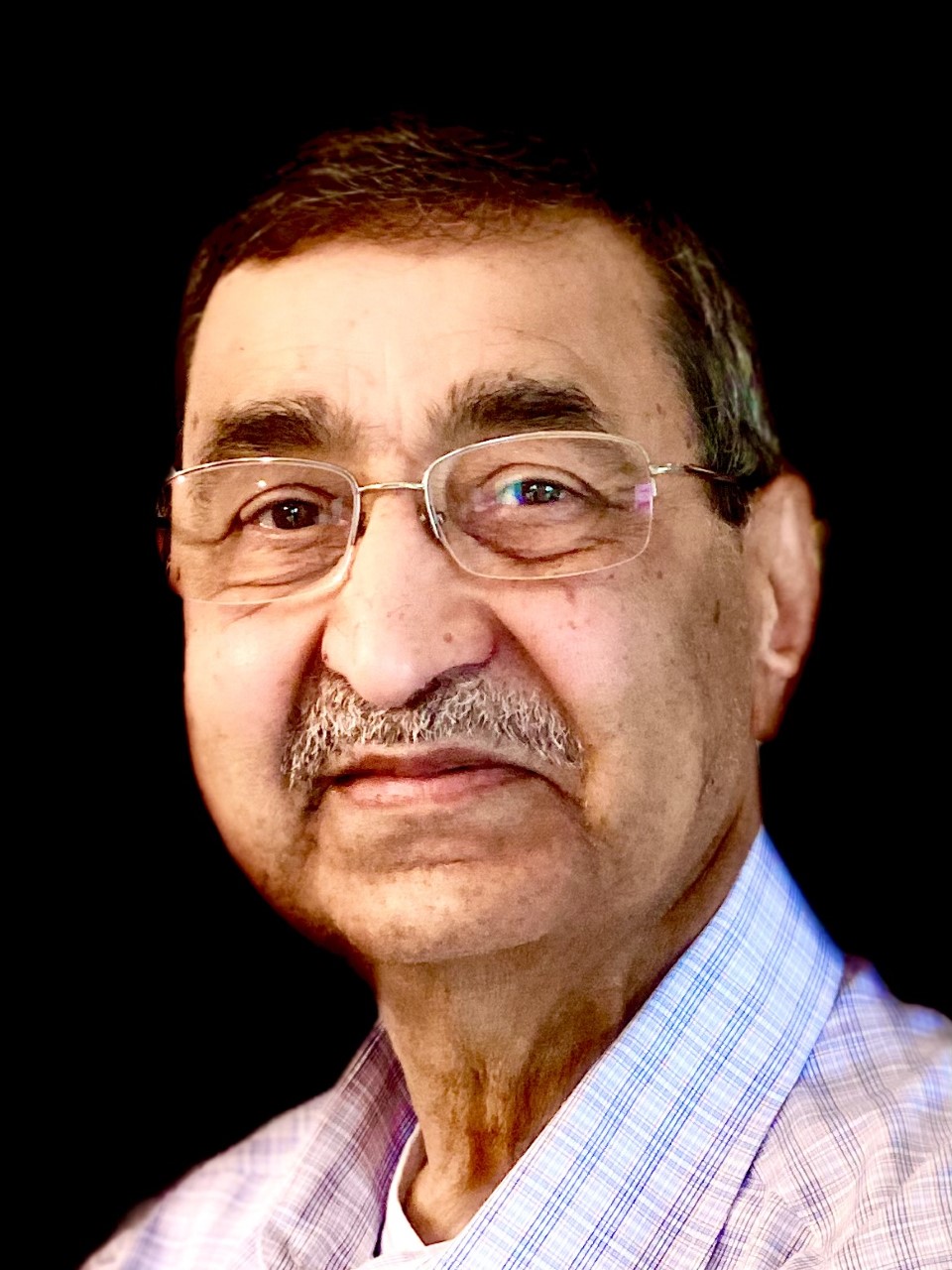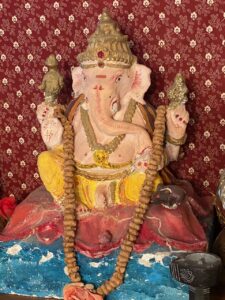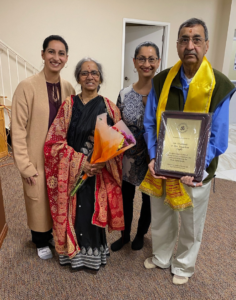
Subhash Dighe retired after 50 years serving in the Hamilton area as a physiotherapist and healthcare administrator. Founder of many organizations and an active volunteer in professional, religious, social, and cultural organizations, Subhash is committed to ensuring that aging health researchers, caregivers, and policy makers are providing ethno-culturally sensitive policies, programs, and healthcare services to our aging population. His multifaceted life experiences and leadership in the community is demonstrated through his roles as a founding member and volunteer at a number of organizations, including the Gandhi Peace Festival and Gandhi Lectureship Foundation at McMaster University; Mahila Shanti Sena (Women’s Peace Corps) and Women’s Peace Brigade International; Seniors Seva Mandal (Hamilton); Hindu Temples in Hamilton, Ottawa and Winnipeg; and Shree Ganesh Yag Pariwar (Toronto).
Fun Facts
Hometown: Vile Parle (suburb of Mumbai), Bombay
Favourite book: As a young child, I read a translation of a book (titled “Akhand Bharari” in Marathi language) on the great Charles Lindbergh’s May 20, 1927 Trans-Atlantic flight from New York to Paris. It made a great impression on me — Lindbergh’s tenacity, perseverance and sheer guts for making possible; the impossible. This inspired me to visit the Smithsonian Museum in Washington, DC to see the airplane, the Spirit of St. Louis, and a copy of the plane used  for a movie and donated by James Stewart preserved at the Henry Ford Museum in Dearborn, Michigan. The Lindbergh story Inspired me to dream big, strive, make sacrifices, and super efforts to immigrate to this beautiful land, Canada.
for a movie and donated by James Stewart preserved at the Henry Ford Museum in Dearborn, Michigan. The Lindbergh story Inspired me to dream big, strive, make sacrifices, and super efforts to immigrate to this beautiful land, Canada.
Hidden talent: I’m very artistic; I do sculptures, and photography (photojournalism); I am a state award-winning stage actor and I speak six languages.
Bucket list item: I have yet to visit Florence, Italy and see the Statue of David. Visit Grand Canyon and Yellowstone National Park in the USA, and Angkor Wat in Cambodia.
Most prized possession: Ganesh Idol I sculpted in August 1969 for our first Ganesh Festival celebrated in Toronto. This led to the foundation of Marathi Bhashik Mandal in Toronto, which is going strong to this day. This clump of modeling clay and paint also spurned me to participate in founding Hindu Temples in Hamilton, Ottawa, and Winnipeg and be involved in community service activities. I am also a founding member of the Gandhi Lectureship Series, Gandhi Peace Festival, MSS – Mahila Shanti Sena, and Women’s Peace Brigade International at McMaster University, Hamilton.
Image: Ganesh Idol sculpted by Subhash in August 1969 for the first Ganesh Festival celebrated in Toronto.
Photo credit: Subhash Dighe
What life experiences do you think have shaped your contributions to the Collaborative most? And what impact do you think this has had?

Canada is and is becoming a more multicultural and multilingual nation. We now seem to be a perfect example of a mini–United Nations here in this country. We have different foods we consume, follow different customs and traditions that affect everybody’s health. What I really would like to see is more inclusive research work that really reflects that diversity. The reason I joined the Collaborative was to be a voice from this multi-ethnic perspective.
My background as a health care worker, in health care administration and a physiotherapist, as well as my involvement in the community, has given me a unique outlook on the health care system.
Physiotherapy is a very unique profession in that when you go to a doctor, you see them for 10-15 minutes, and you’re done. Whereas a physiotherapist, you go several times in a year or for a longer period of time. For example, I had patients that I followed for 45 years. You get to know your patients as individuals and real people.
I was also involved with the rebuilding of St. Peter’s Hospital in Hamilton and established several programs there. For example, we developed the advanced state of Art Meals on Wheels program and brought in a library branch in the hospital So that community members could come in hospital and interact with the Shut in patients.
So those experiences, working with the aging community and long-term care disabled people, were some of the reasons I joined the Collaborative. I think the Collaborative is really a pillar of research in human aging and I wanted to be a voice for these communities to ensure that we are not forgetting to address the issues of these communities.
What issues do you think most affect the quality of life of older adults as they age?
One of the main things that I think older adults are looking for is financial security. If you have that, then other things become more accessible. That stability is important. Also, your bodily functions and overall health can affect the quality of life as you age. You become slower and there are a lot of things that become different in your day-to-day activities that can be difficult to keep up with.
Another thing that is very important is family support among older people. And here is something that I’m very passionate about. It became very acute to me when we were setting up the systems for Saint Peters Hospital how different some of our ethnic and cultural differences are. At that time, I had thought “wouldn’t the children come and help these people in who are using some of these services?” Where I grew up, your parents looked after you until you got settled in your life and then it’s the kids who would look after their parents. And it has been working for thousands of years. Whereas in this country, I realized that that’s not always the case. Freedom and independence are much more valued here, and for that reason I saw some very sad things. I mean, at Saint Peter Hospital, nobody would come to visit their parents or relatives, unless something went wrong. I hope we can help change some of that.
If you could change one thing about the services and supports in healthcare that are available to older adults, what would it be?
It’s not so much of a change that I want to see, but I think there should be more focus on and availability of home care if our objective is to keep people in their own home as long as possible.
Right now, emergency wait times and patients in hospital beds are at an all-time high. If we had proper home care or more home care services, that could really help address some of the issues of overcrowding.
In the olden days, the doctor came to visit your home. The home visits by physicians are almost gone now. And those visits at home helped to make sure that the doctor really got a feel for you and the environment you were in. We have tremendously talented nurse practitioners and social workers that can help with these home visits. There’s an example in England where they did a study whereby the mail carrier would keep an eye on things. Basically, chat a little bit to see how they were doing or see if somebody needed anything. They could point these out or get access to the services needed.
What advice would you give to researchers who are interested in partnering with older adults in aging-focused research?
My advice to the researchers would be to consult the older adults during the planning and design phases of the research about what questions need to be addressed.
Be fully aware of the different ethnicities, cultures, and traditions among the aging, because they all affect health care and the health of people. We’re not all the same people. This is a great “lab” we have in here in Canada. We really do come from all different parts of the world here, so let’s not just look at one aspect of it – let’s include everybody.
And also: be patient, understanding, and respectful of us elders!
What three words would you use to describe your experience within the Collaborative?
Camaraderie. Participatory. Educational.
